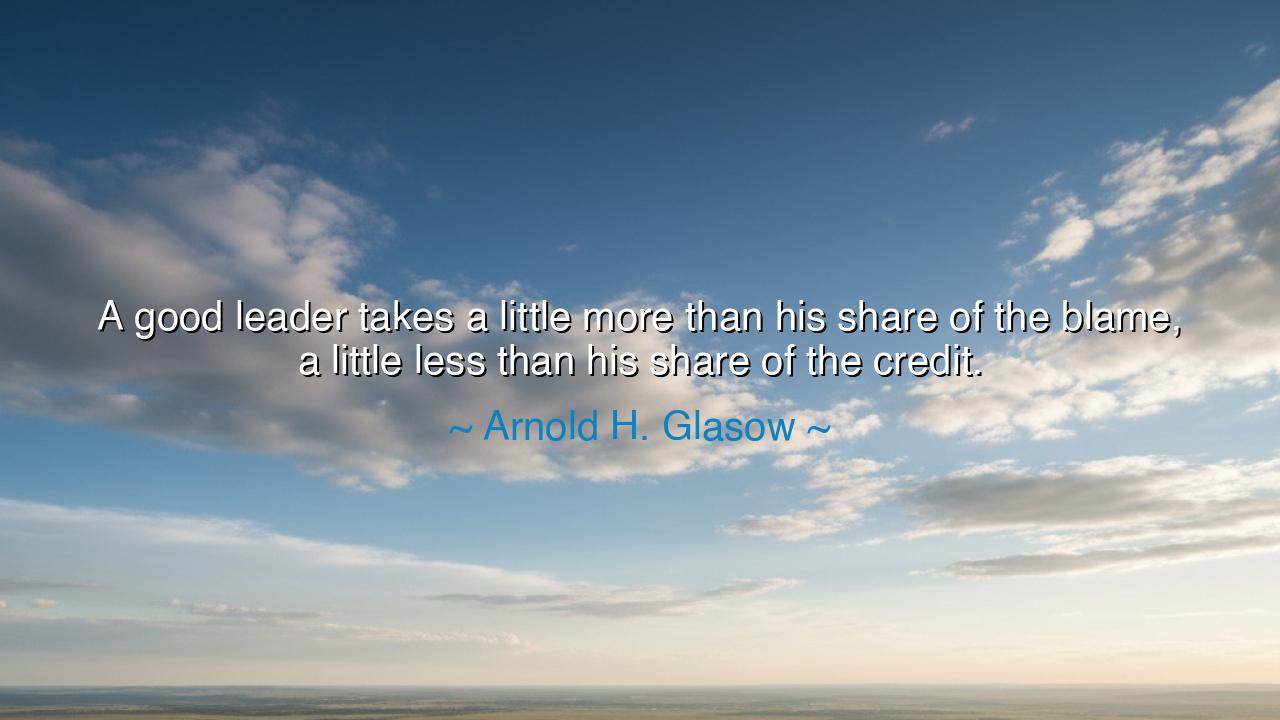
A good leader takes a little more than his share of the blame, a
A good leader takes a little more than his share of the blame, a little less than his share of the credit.






“A good leader takes a little more than his share of the blame, a little less than his share of the credit.” Thus wrote Arnold H. Glasow, the American businessman and humorist whose words, though light in tone, carry the gravity of ancient wisdom. In this saying lies the essence of humility and responsibility—the twin pillars upon which all true leadership rests. For to lead is not merely to command; it is to bear the weight of others’ faults and to share sparingly in the glory of their triumphs. A good leader knows that greatness is not measured by how high he stands above his followers, but by how deeply he stoops to lift them up.
To take a little more than his share of the blame is the mark of strength disguised as sacrifice. When things go awry, the weak seek to escape fault; they point fingers, they shift burdens, they protect their pride. But the true leader shields his people as a father shields his children from the storm. He does not ask, “Who is to blame?”—he asks, “What can I do to make it right?” He stands at the forefront of failure, absorbing its sting so that his followers may rise unbroken. For he knows that the moment a leader begins to blame others, his power to inspire vanishes like mist before the sun.
And when success arrives—when victory is won and the song of triumph fills the air—the wise leader does not reach for the crown. He steps back, offering it to others. He takes a little less than his share of the credit, for he understands that pride divides, but gratitude unites. He gives glory to the hands that labored, to the minds that planned, to the hearts that believed. In doing so, he multiplies loyalty a hundredfold. His people, seeing his humility, are moved to follow him not out of fear or duty, but out of love.
Arnold Glasow, who lived through the rise and fall of great enterprises, knew that the soul of leadership was character, not charisma. He saw how leaders who sought credit became tyrants of ego, while those who shared it became builders of legacy. His words were a gentle rebuke to a world obsessed with recognition—a reminder that the leader’s glory is not in being praised, but in being trusted. For in the long measure of history, the names of those who claimed glory fade quickly, but those who gave it away are remembered forever.
Consider the story of George Washington, the first President of the United States. At the close of the Revolutionary War, he could have seized power, crowned himself king, and claimed the entire triumph as his own. Instead, he laid down his sword, returned to his farm, and gave the credit to his soldiers, his nation, and the cause of liberty. Later, when called to lead again, he served humbly and stepped away when his work was done. He took upon himself the burdens of blame, accepted the weight of decision, but refused the vanity of praise. In his restraint lay his greatness; in his humility lay his immortality.
This is the sacred paradox of leadership: the more one gives away, the more one gains. When a leader absorbs blame, he earns respect; when he shares credit, he gains loyalty. But when he hoards praise and avoids responsibility, he rules only through fear—and fear is a frail foundation for power. The wise leader sees beyond the moment’s reward; he plants seeds of trust that will bear fruit for generations. For to lead is not to dominate others, but to awaken the best within them.
Therefore, O seeker of wisdom, if you would lead others—be it in your home, your craft, or your nation—remember the path of humility and accountability. When failure comes, step forward and bear it. When success comes, step back and share it. Let your words lift others, not yourself; let your actions prove your worth, not your boast. In every season, take a little more of the burden and a little less of the glory, and your people will follow you not because they must, but because they choose to.
The lesson is clear: True leadership is not a pursuit of power, but a practice of service. A good leader stands tallest when he bows first, and shines brightest when he lets others stand in the light. The world remembers such leaders not for their triumphs alone, but for their grace—the quiet strength that bore the blame and gave away the credit. For in the end, as Arnold H. Glasow taught, the noblest heart is not the one that demands recognition, but the one that uplifts others into greatness.






AAdministratorAdministrator
Welcome, honored guests. Please leave a comment, we will respond soon